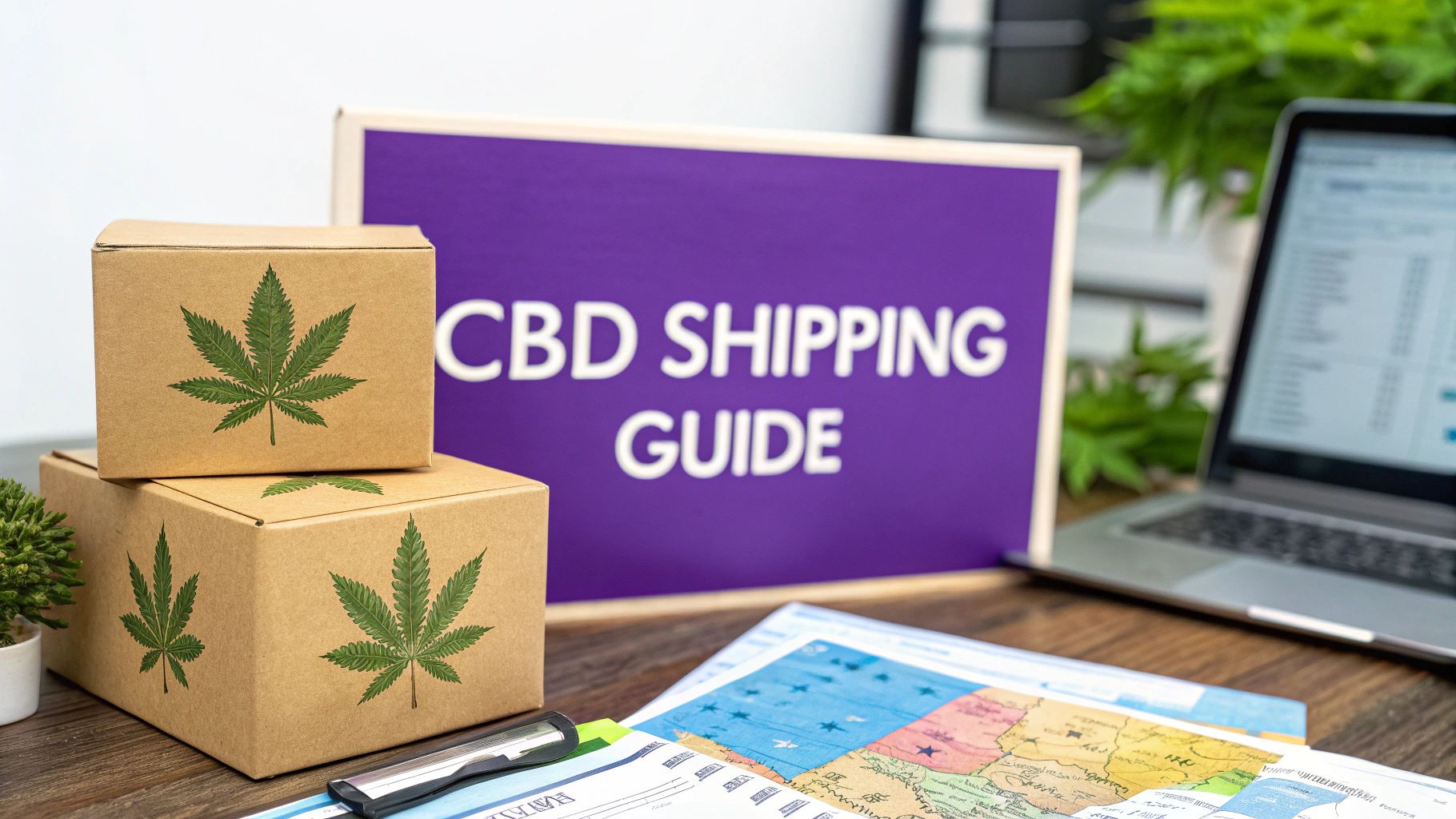
CBD Shipping Laws by State: Complete 2025 Compliance Guide
Stay compliant with our CBD Shipping Laws by State: Complete 2025 Compliance Guide. Discover essential tips to ship legally and avoid costly mistakes.
Cody Y.
Updated on Sep 19, 2025
Shipping CBD across state lines can feel like walking a tightrope, but it all starts with one core rule. As of 2025, the 2018 Farm Bill makes it federally legal to ship any hemp-derived CBD product that contains less than 0.3% THC. While that federal green light gets you started, it's far from the end of the compliance road.
Understanding the Federal Rules for Shipping CBD
Before you even think about state-specific laws, you need to have the federal framework locked down. The 2018 Agriculture Improvement Act—better known as the 2018 Farm Bill—is the single most important piece of legislation for any CBD ecommerce business. It's what created this industry in the first place.
The bill's most critical takeaway for online sellers is the 0.3% delta-9 THC threshold. If a product comes from the cannabis sativa plant but stays at or below that THC limit, it's legally considered hemp. Go even a fraction of a point over, and it's classified as marijuana, a federally controlled substance. This distinction is everything.
Hemp Versus Marijuana: A Critical Distinction
The line between a legal shipment and a federal crime is razor-thin, and it’s defined entirely by THC content.
- Hemp-Derived CBD: Federally legal and shippable across state lines as long as it contains ≤ 0.3% THC. This is the only kind of CBD product you can legally ship.
- Marijuana-Derived CBD: Federally illegal because it contains > 0.3% THC. Shipping these products is a serious offense, even if both the origin and destination states have legalized marijuana.
Getting this right is the absolute first step in building a shipping strategy that won't land you in hot water.
Major Carrier Policies and Requirements
Because of federal legalization, the major shipping carriers have all created official policies for handling CBD. As of 2025, the United States Postal Service (USPS), UPS, FedEx, and DHL all accept hemp-derived CBD shipments that meet the < 0.3% THC standard. This is what makes nationwide ecommerce possible.
To stay compliant, these carriers will require you to have your documentation in order. The most important document is a Certificate of Analysis (COA). This is a report from a third-party lab that proves your product’s cannabinoid profile and confirms its THC content is within the legal limit.
Keeping organized and easily accessible COAs isn't just a good idea—it's a must. It’s your ticket to avoiding seized shipments and legal trouble. You can get a deeper look at these paperwork requirements in our detailed guide on hemp shipping rules and restrictions.
Quick Reference Federal CBD Shipping Requirements 2025
Before we dig into the state-by-state nuances, here’s a quick summary of the federal rules every CBD seller must follow. Think of this as your pre-flight checklist for every single package you send.
| Compliance Area | Requirement Detail | Key Action for Sellers |
|---|---|---|
| THC Content | All products must contain ≤ 0.3% delta-9 THC by dry weight. | Always verify product THC levels with a third-party lab before listing for sale. |
| Source Material | CBD must be derived from hemp, not marijuana, as defined by the 2018 Farm Bill. | Maintain clear records tracing your products back to a licensed hemp farm. |
| Documentation | A valid Certificate of Analysis (COA) from a third-party lab must be available for each product batch. | Have COAs ready to provide to carriers or authorities upon request. Many sellers include a QR code on the packaging linking to the COA. |
| Carrier Compliance | Adhere to the specific policies of your chosen carrier (USPS, UPS, FedEx, etc.). | Review and understand your carrier's most up-to-date hemp/CBD shipping policy. |
| Business Licensing | The business must be licensed and compliant with all regulations under the 2018 Farm Bill. | Ensure your business and your suppliers hold all necessary state and federal licenses to cultivate, process, and sell hemp. |
Mastering these federal requirements is non-negotiable. They form the foundation upon which all state-level laws are built. With this baseline covered, you'll be much better prepared to handle the patchwork of state regulations that follows.
A Framework for Navigating State CBD Shipping Laws
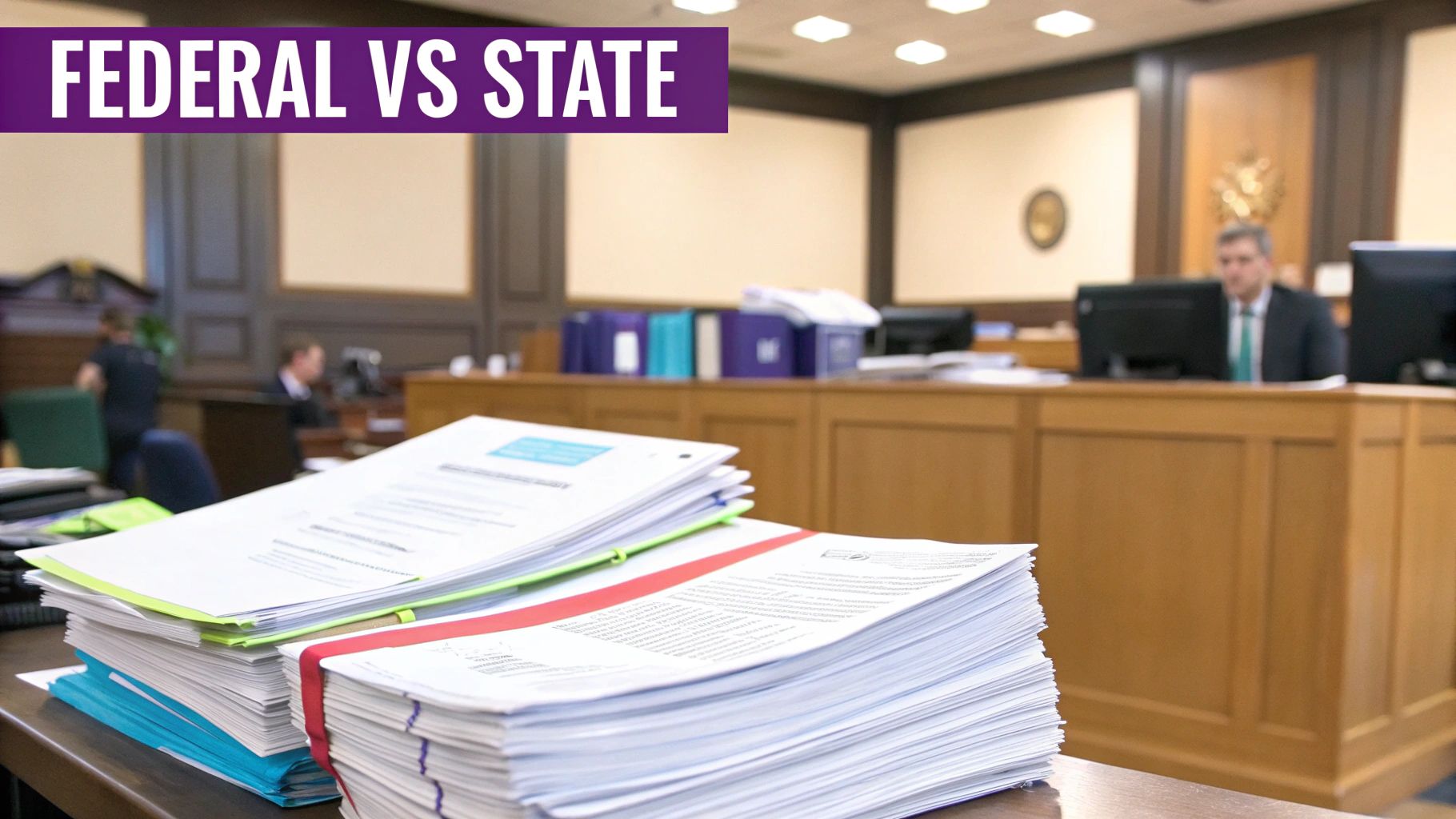
While the 2018 Farm Bill set a federal baseline for hemp-derived CBD, the real work for any e-commerce brand happens at the state level. The laws are a messy patchwork, and trying to apply a single shipping policy nationwide isn’t just inefficient—it’s a surefire way to run into compliance trouble.
To cut through the noise, you can sort every state into one of three categories based on how they handle CBD. This simple framework is the key to building a smart, scalable shipping strategy. Knowing where a state lands helps you assess risk and, more importantly, automate your compliance so you can focus on growing your business.
The Three Tiers of State CBD Laws
To ship CBD across the country without constant headaches, you have to segment states by their legal attitude. Each tier demands a totally different approach at checkout, from allowing all orders to blocking them completely. This is a core concept we’ll unpack throughout our CBD Shipping Laws by State: Complete 2025 Compliance Guide.
Here’s how the three tiers break down:
- Permissive States: These are the easiest states to deal with. Their laws mostly mirror federal guidelines, meaning they allow shipments of hemp-derived CBD products with less than 0.3% THC without much fuss.
- Hemp-Only States: This is the biggest and most complicated group. Shipping here is legal, but states often have their own hemp programs with specific rules on licensing, product registration, or labeling. The details matter.
- Restrictive States: Shipping to these states is either flat-out illegal or comes with major legal risks. They might enforce a "zero THC" policy or ban specific product types, like smokable flower or certain edibles.
Automating these rules is non-negotiable. For instance, you absolutely must know how to block shipping to specific states with WooCommerce plugins to keep your products from ending up in a restrictive state. One mistake can lead to seized shipments and legal threats.
Why a Single Shipping Policy Fails
Even as we head into 2025, the state-by-state landscape is full of traps for CBD sellers. States like Idaho and South Dakota still treat most CBD products as illegal or impose heavy restrictions. Ignoring these local laws can get your packages seized, land you hefty fines, or drag you into a legal battle you can't win.
The biggest mistake a growing CBD brand can make is assuming federal compliance is enough. State law always adds another layer of complexity that must be addressed at checkout, not after the package is already in transit.
This principle of categorizing and restricting sales by location isn’t just for domestic sales. As you grow, understanding robust Shopify international shipping strategies becomes essential for tackling an even wilder set of global regulations. It's a fundamental practice for any e-commerce business selling regulated products.
Permissive States: Your Guide to Low-Risk Shipping
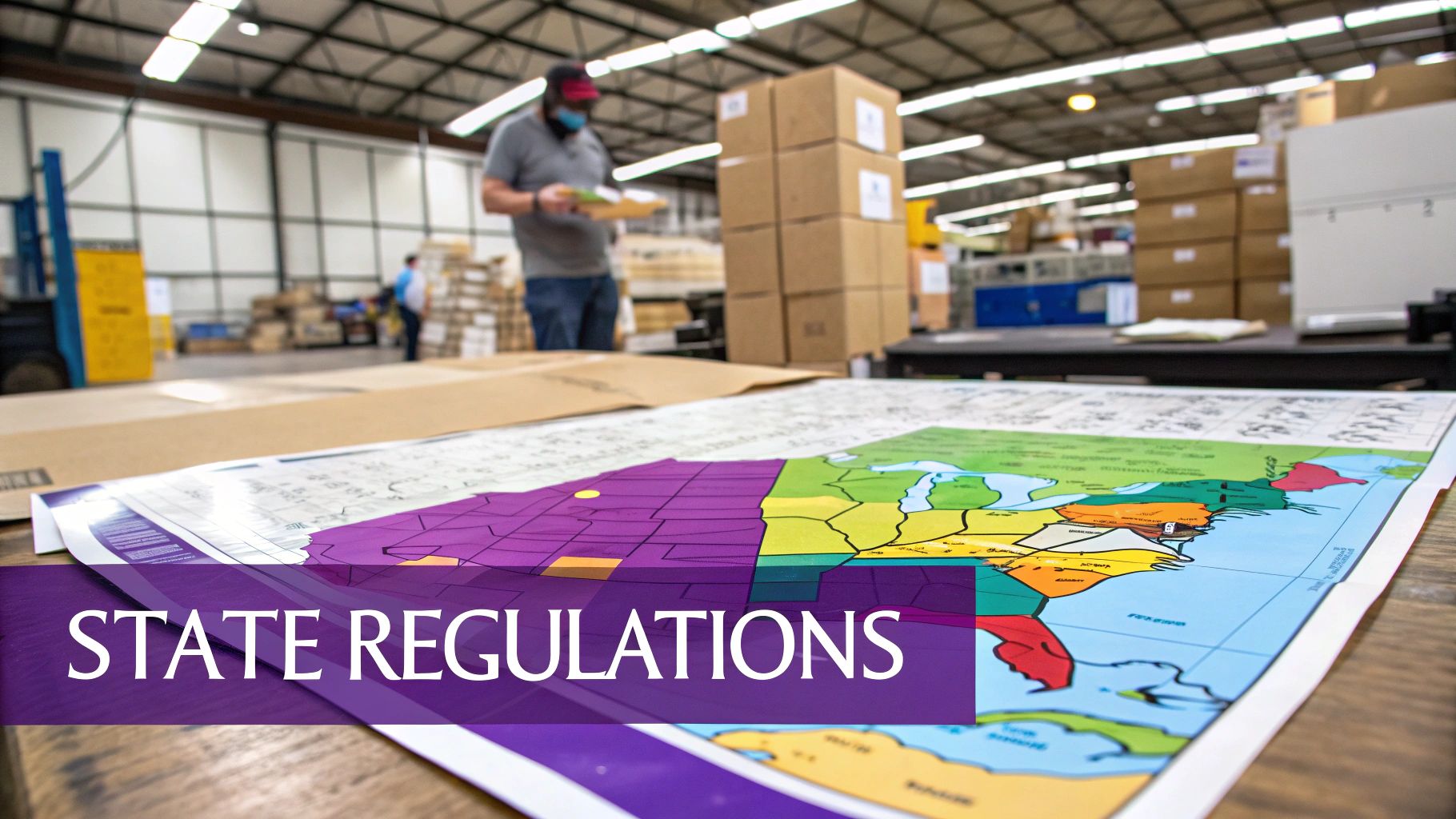
Trying to make sense of the CBD legal map can feel overwhelming, but here's the good news: a lot of states have lined up their laws pretty closely with the federal 2018 Farm Bill. We call these permissive states, and for any e-commerce brand, they’re the lowest-risk markets and the bedrock of a solid national shipping strategy.
For the most part, if your products are federally compliant—meaning they’re derived from hemp and contain less than 0.3% THC—you can ship to these states with confidence. Still, "permissive" doesn't mean you can just set it and forget it. Even in these friendly states, small details can trip you up. This section of our CBD Shipping Laws by State: Complete 2025 Compliance Guide will break down the key permissive states, giving you a quick way to confirm your safest shipping zones. Getting a handle on these markets is your first real step toward building a compliant, scalable CBD business.
Identifying the Key Permissive States
While the list can shift, a core group of states has consistently kept their regulatory environment straightforward for hemp-derived products. These are typically states with mature industrial hemp programs that have fully embraced the federal definition of hemp. For online sellers, that means a bigger, more accessible customer base with fewer legal headaches.
-
California: As a long-time leader in the cannabis space, California fully allows the sale and shipment of hemp-derived CBD products that meet the 0.3% THC federal limit. The state has clear-cut regulations that separate hemp from marijuana, making it one of the largest and most dependable markets out there.
-
Colorado: A true pioneer in both hemp farming and marijuana legalization, Colorado’s laws are well-established and predictable. Shipping federally compliant CBD products into Colorado is a low-risk move, thanks to a state framework built to support its huge hemp industry.
-
Oregon: Much like its West Coast neighbors, Oregon runs a strong hemp program with clear laws that mirror federal standards. E-commerce businesses can confidently ship compliant CBD oils, topicals, and other products to customers across the state without issue.
These states are prime examples of permissive markets where your main compliance checkpoint is simply staying under the federal THC limit.
Don't Overlook the Minor Details in Permissive States
Even within this low-risk group, you’ve got to stay sharp about subtle local rules that could affect your shipments. They’re rarely deal-breakers, but they often involve things like labeling, testing requirements, or specific product types.
For instance, some states might require QR codes on the packaging that link directly to a product's Certificate of Analysis (COA). Others could have age verification rules that you have to enforce at checkout.
Pro Tip: Never assume a state's permissive attitude applies to your entire product catalog. CBD oils and topicals are almost universally accepted, but newer products like CBD-infused alcoholic drinks or certain inhalables might run into unique restrictions, even in otherwise open states. Always double-check the rules for your specific products.
Automating your shipping rules is the only sane way to manage these details without losing your mind. A tool like Ship Restrict lets you set incredibly specific rules not just by state, but by product category. This means that even if a state like California is generally open for business, you can still block a specific, restricted product type from being shipped there, stopping compliance mistakes before they ever happen.
Best Practices for Shipping to Permissive States
To keep things running smoothly when shipping to these easier markets, just run through a simple checklist for every order. It helps you stay compliant and protects your business, even in the safest states.
- Confirm Federal Compliance: First and foremost, make sure the product has a current COA verifying its THC content is at or below 0.3%. This document is your first line of defense.
- Review Labeling Requirements: Give your product labels a once-over to ensure they meet both federal standards and any state-specific rules, like QR codes, batch numbers, or particular warnings.
- Use a Compliant Carrier: Stick with the major carriers like USPS, UPS, or FedEx. They have clear, established policies for shipping hemp-derived products.
- Keep Your Docs Handy: Have digital copies of COAs and supplier licenses ready to go. You won’t always need to include them in the box, but you must be able to produce them instantly if a carrier or regulator comes knocking.
By treating every shipment with this level of diligence, you can take full advantage of the opportunities in permissive states while keeping your risk to a minimum. This structured approach, especially when backed by automated compliance tools, is what separates the pros from the amateurs in the CBD e-commerce world.
Hemp-Only States: A Guide to Conditional Shipping
Welcome to the largest and most complex category of states: the "Hemp-Only" group. Navigating these requires a sharp eye for detail. Unlike permissive states that pretty much stick to federal guidelines, these states have their own industrial hemp programs. This means that even if your CBD is federally compliant, you’ve got an extra layer of state-specific rules to follow.
These regulations can cover everything from mandatory seller registration to outright bans on certain products. For any e-commerce business, this category is a huge market opportunity, but it's also where the risk of accidentally breaking the rules is highest. Mastering the nuances in this part of our CBD Shipping Laws by State: Complete 2025 Compliance Guide is the key to shipping with confidence.
Understanding State-Level Hemp Programs
The defining feature of a "hemp-only" state is that it actively regulates the hemp industry within its borders. Think of places like Florida and Texas. They don't just nod at the 2018 Farm Bill; they build on it with their own laws and enforcement.
For online sellers, this often creates a checklist of compliance tasks that have to be handled before a package even gets a shipping label.
- Potential Registration or Licensing: Some states might demand that out-of-state businesses shipping to their residents register with their department of agriculture.
- Product-Specific Prohibitions: A state might be perfectly fine with CBD oils and topicals but explicitly ban other product forms, like smokable hemp flower or certain kinds of edibles.
- Strict Labeling and Testing Mandates: These states often have very precise rules for what has to appear on a product label, including QR codes linking to lab reports, batch numbers, and specific warning statements.
This decision tree gives you a visual of the basic checkpoints for making sure a shipment is compliant before it ever leaves your warehouse.
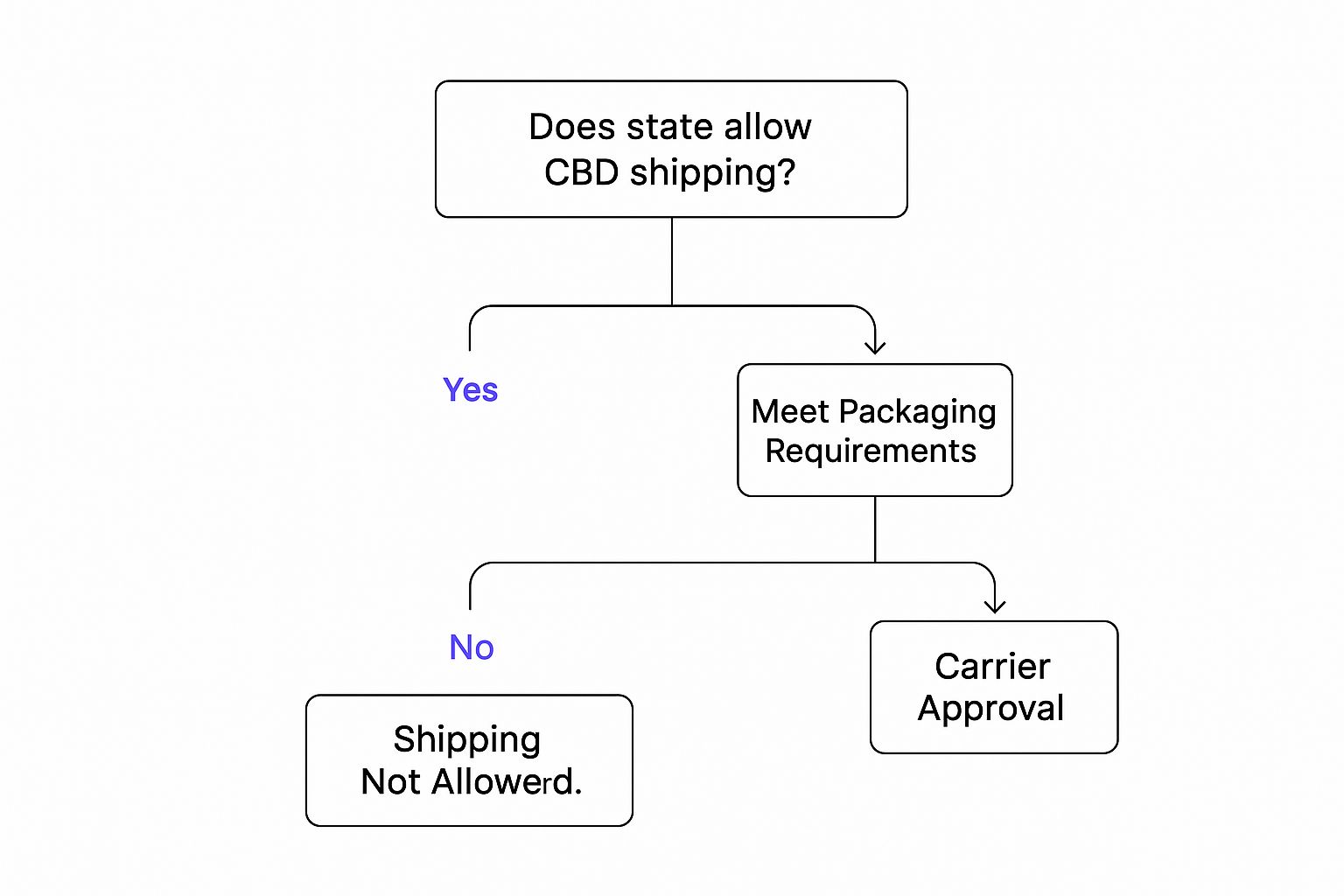
As the flowchart shows, getting state approval is just the first step. After that, you still have to deal with packaging and carrier rules that can change depending on the destination.
The Absolute Necessity of Certificates of Analysis (COAs)
When you're shipping to a hemp-only state, your most important compliance tool is the Certificate of Analysis (COA). This document, which comes from a third-party lab, is non-negotiable proof that your product sticks to the legal 0.3% THC threshold.
While a COA is crucial everywhere, it carries extra weight in these states. Regulators here are far more likely to run checks, and having instant access to a valid COA for every batch you ship can be the difference between a smooth delivery and a seized package.
Think of a readily available COA as your legal shield. It proves you've done your due diligence and shows state authorities and carriers that you are a legitimate, compliant business. Without it, you’re basically shipping on faith—a bad strategy in a regulated industry.
Product-Specific Restrictions: The New Frontier of Compliance
It's not just about general THC limits anymore. Many hemp-only states are now making rules for specific product categories, and the market for hemp-infused drinks is a perfect example of this shifting landscape. By 2025, regulations for shipping these products have evolved fast, reflecting both market growth and regulatory caution. For instance, 24 states now explicitly permit the sale of hemp-based beverages with trace THC, but 11 states have imposed outright bans as of early 2025. Another ten states have set strict THC potency caps. You can get more insights on these THC drink market laws and how they affect e-commerce.
This trend highlights a critical point: you can no longer assume that if one of your CBD products is legal in a state, all of them are. This is exactly where automated shipping rules become a lifesaver. Tools like Ship Restrict let you build granular restrictions that block specific products from being shipped to certain states, while allowing your other products to go through without a problem. This prevents the kind of costly compliance mistakes that happen with one-size-fits-all shipping policies. By automating these nuanced rules, you protect your business from legal trouble and give your customers a seamless checkout experience, no matter where they are.
A Guide to High-Risk, Restrictive States
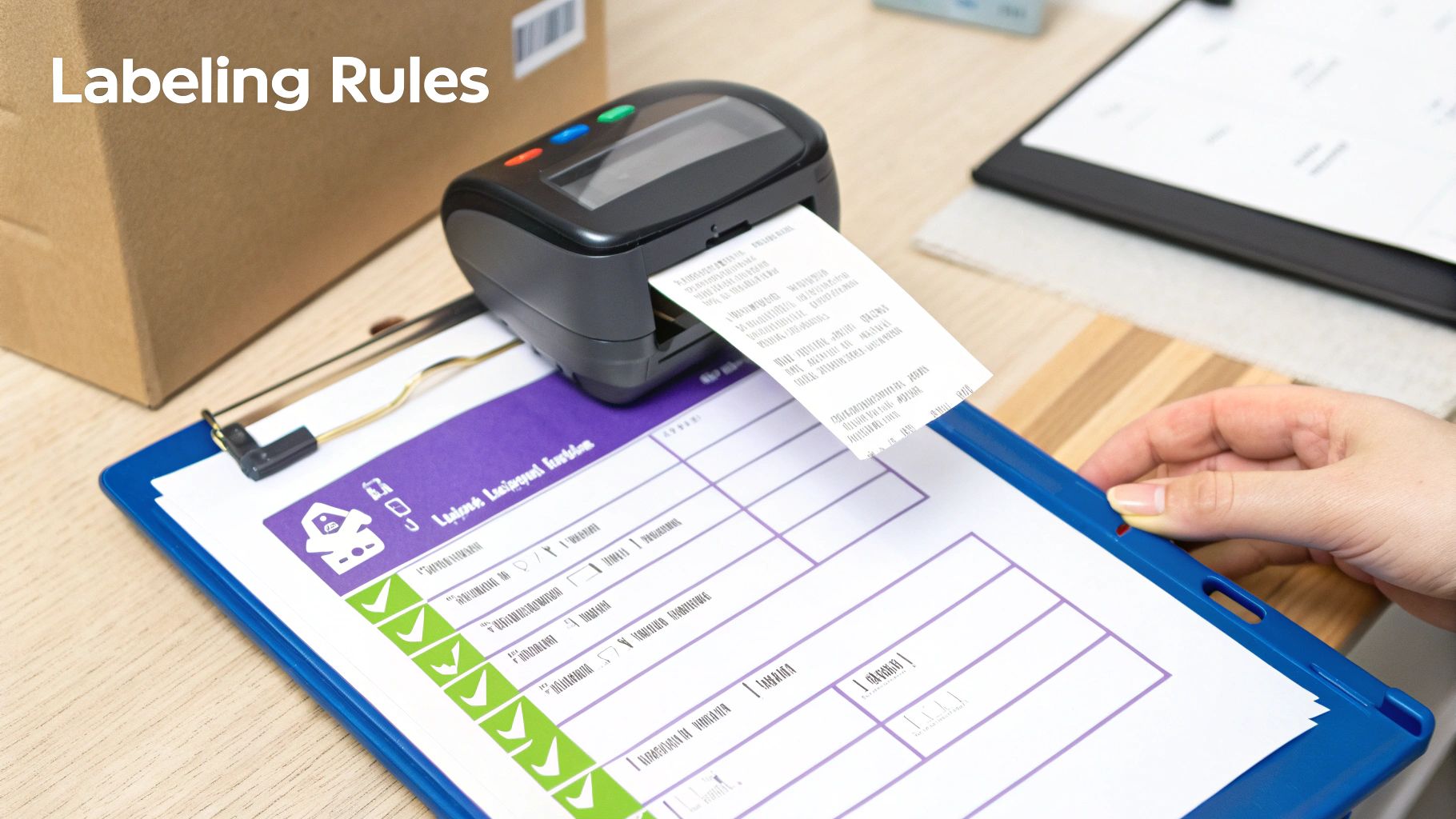
Now we get to the most critical category for any CBD seller: the restrictive states. Think of these as the absolute "no-fly" zones on your shipping map. Unlike permissive or even hemp-only states, trying to ship most CBD products here isn't just a compliance headache—it's a massive legal and financial gamble.
Understanding why these states are completely off-limits is a cornerstone of this CBD Shipping Laws by State: Complete 2025 Compliance Guide. The penalties for messing this up are severe, ranging from seized packages and painful fines to potential criminal charges. For an e-commerce business, this isn't an area for interpretation; it's an area for strict, automated avoidance.
Defining Your No-Ship Zones
Restrictive states are defined by local laws that flat-out contradict the federal 2018 Farm Bill. While federal law greenlights hemp-derived products with up to 0.3% THC, these states have passed their own, much tougher regulations. This creates a legal minefield where your federally legal product becomes contraband the moment it crosses their state line.
The two states that every CBD seller needs to red-flag immediately are:
- Idaho: Idaho law is notoriously strict. It demands that all legal hemp products contain zero THC. This "THC-free" requirement effectively outlaws the vast majority of full-spectrum and broad-spectrum CBD products, which often contain trace, non-intoxicating amounts of THC that are well below the federal limit.
- South Dakota: The state has a medical cannabis program, but its laws around general hemp-derived CBD are incredibly hostile to online sellers. Vague statutes and a history of aggressive enforcement make shipping any product containing any amount of THC a high-risk move.
These states are clear red flags. Attempting to fulfill an order to an Idaho or South Dakota address is a direct violation of state law, and pleading ignorance won't hold up as a defense.
The Severe Risks of Non-Compliance
Shipping into a restrictive state can trigger disastrous consequences that go far beyond a lost sale. The potential fallout can threaten your entire business operation.
The single biggest compliance error a CBD brand can make is shipping an order to a prohibited state. The legal exposure and financial loss from one mistake can erase the profits from a hundred successful sales.
Let's break down exactly what's at stake:
- Package Seizure: Carriers and state authorities can—and do—confiscate packages they suspect contain illegal substances. You lose the product, the shipping costs, and the customer.
- Financial Penalties: State agencies can levy substantial fines against businesses that violate their controlled substance laws.
- Legal Action: In a worst-case scenario, you or your business could face criminal charges for trafficking what the state defines as a controlled substance.
- Payment Processor Termination: If your payment processor finds out you're shipping illegally, they will likely terminate your account immediately. This can cripple your ability to do business overnight.
Given these stakes, relying on a human to manually check every order's destination just isn't a scalable or reliable solution. One slip-up is all it takes to expose you to all of these risks.
To help you visualize the different tiers of risk, we've broken down the state categories into a simple comparison. This table highlights how the legal landscape shifts from relatively open to completely closed, underscoring why a one-size-fits-all shipping policy is a recipe for disaster.
CBD Shipping Risk Level by State Category
| State Category | General Legal Status | Primary Shipping Risk | Key Compliance Action |
|---|---|---|---|
| Permissive | Fully aligned with the 2018 Farm Bill; all hemp-derived CBD products are legal. | Low. Primarily concerns product claims and marketing compliance. | Ensure COAs are available and avoid making unapproved health claims. |
| Hemp-Only | Allows hemp-derived CBD but has stricter rules, often banning certain product types. | Moderate. Risk of shipping a prohibited product type (e.g., smokable flower). | Use product-specific shipping rules to block restricted items to these states. |
| Restrictive | State laws directly conflict with federal law, banning most or all THC-containing CBD. | High. Risk of seizure, fines, and legal action for any non-compliant shipment. | Implement a complete shipping block for the entire state. No exceptions. |
As you can see, the compliance actions become progressively more stringent. For permissive states, it's about good practice. For hemp-only states, it's about targeted restrictions. But for restrictive states, the only safe move is a complete and total block.
Automating Protection with Shipping Rules
This is precisely where an automated compliance tool becomes non-negotiable. A platform like Ship Restrict lets you create definitive, automated "no-ship" rules for these high-risk states. Instead of depending on a manual checklist, the system physically stops a customer from completing a purchase if their shipping address is in a restricted zone.
For example, you can set a rule in Ship Restrict to block all sales to Idaho and South Dakota. When a customer from Boise enters their address, they'll see a custom message explaining that you can't ship there due to state regulations. This not only guarantees 100% compliance but also delivers a professional customer experience, preventing frustration and chargebacks down the line.
By automating your 'no-ship' list, you transform a major legal vulnerability into a simple, background process. It frees you up to focus on serving your legitimate markets safely and confidently.
Mastering Your Compliance Documentation
Knowing the patchwork of CBD shipping laws state-by-state is only half the battle. The real test? Proving your compliance with flawless paperwork. Think of it this way: every shipment you send is an extension of your brand’s commitment to legality, and organized documentation is your first and best line of defense against regulatory heat.
The single most important document in your arsenal is the Certificate of Analysis (COA). Issued by an independent, third-party lab, this report is non-negotiable proof that your product’s delta-9 THC concentration is at or below the federal limit of 0.3%. A COA is your golden ticket, confirming to carriers and authorities that you are shipping legal hemp, not marijuana.
Your Essential Documentation Checklist
Beyond the COA, you need a complete and accessible file of compliance documents, ready to go at a moment's notice. Scrambling for paperwork when a regulator comes knocking is not a good look.
Here’s what every CBD business must have on hand:
- Third-Party COAs: Make sure you have a current COA for every single product batch you sell. These reports validate cannabinoid potency and, most importantly, confirm THC levels.
- Producer Licenses: Keep copies of the licenses from the hemp farms or producers who supply your raw materials. This creates a clear paper trail, proving your product originates from a legitimate, state-sanctioned source.
- Compliant Product Labels: Your labels have to meet both federal and state requirements. This often includes batch numbers, net weight, and a QR code that links directly to the corresponding COA for easy verification.
A readily accessible COA is more than just a piece of paper—it’s your legal shield. It demonstrates due diligence and immediately separates your legitimate business from bad actors in the eyes of regulators.
Properly managing these documents is fundamental, especially for online stores where fulfillment speed is everything. Integrating this process with your shipping workflow is key. Many sellers find that using tools for automated shipping compliance for WooCommerce stores ensures the right products, backed by the right paperwork, are sent only to permissible locations. It's a proactive approach that prevents costly mistakes before they happen, safeguarding your business from seized shipments and legal headaches.
Questions We Hear All the Time About CBD Shipping
Even with a solid grasp of the big picture, the day-to-day details of shipping CBD can bring up some tricky questions. Here are the clear, straightforward answers to the issues we see e-commerce sellers wrestle with the most.
Can I Ship CBD Products Internationally From The USA?
Honestly, shipping CBD internationally is a high-wire act without a net. We generally tell most businesses to avoid it. While your hemp-derived products are federally legal to ship within the U.S., every single destination country has its own rulebook for hemp and cannabis.
Many countries have a flat-out zero-tolerance policy. One wrong move could mean your package gets seized and destroyed. In a worst-case scenario, you and your customer could even face serious legal trouble. Before you even think about an international sale, you absolutely must verify the destination country's specific import laws.
What Happens If My CBD Shipment Is Seized?
If a carrier or law enforcement agency flags and seizes one of your packages, what happens next really depends on why it was stopped. Sometimes, it's a simple paperwork problem, like a missing Certificate of Analysis (COA). If that's the case, you might be able to fix it by quickly providing the correct documentation.
But if the product violates a state's THC limits or you accidentally shipped to a state where it's banned, the consequences get much more serious. You're looking at a total loss of your product, potentially steep fines, and even legal action. This is where automated compliance becomes critical.
Do Shipping Laws Differ For CBD Topicals Versus Edibles?
Yes, they absolutely can. While the federal government is mostly focused on that 0.3% THC line in the sand, individual states often drill down and create specific rules for different types of CBD products.
For instance, a state might be perfectly fine with CBD topicals and oils but completely ban the sale of CBD-infused foods, drinks, or smokable hemp. It's on you to check the specific regulations for every single product category you sell. For merchants trying to keep all these rules straight, choosing the right e-commerce platform is a crucial first step in building a compliant and effective online store.
Stop guessing and start automating. Ship Restrict lets you create precise shipping rules by state, ZIP code, or product so you never send a restricted item to the wrong place again. Protect your business and eliminate fulfillment errors. Visit https://shiprestrict.com to get started.

Cody Yurk
Founder and Lead Developer of ShipRestrict, helping e-commerce businesses navigate complex shipping regulations for regulated products. Ecommerce store owner turned developer.